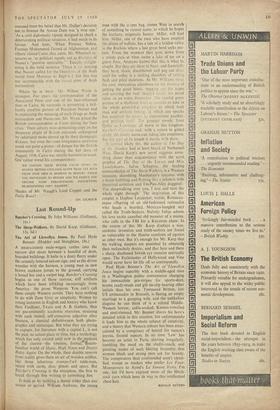Last Round-Up
The Art of Llewellyn Jones. By Paul Hyde Bonner. (Hodder and Stoughton, 18s.)
A HIGH-LOADED mule-wagon rattles into the narrow dirt street between a handful of drab, boarded buildings. It halts in a dusty flurry under the ornately lettered saloon sign, and as the driver wrestles with the harness, a young man in new brown nankeen jumps to the ground, carrying a broad hat and .a carpet bag. Butcher's Crossing begins as one of those curious, stiff artifacts which have been tackling increasingly from America : the prose Westerns. You can't call them simply Western novels. They have nothing to do with Zane Grey or simplicity. Written by Young lecturers in English and history who know their Faulkner, Twain and A. B. Guthrie, they are pre-eminently academic exercises, straining with each muted, self-conscious adjective after fineness, a classical definitiveness both photo- graphic and statuesque. But what they are trying to capture, for literature with a capital L, is not the past, no actual place or time, but a mythology which has only existed until now in theinedium of the cinema--the timeless, formal7tIream- familiar world of Shane, High Noon and Destry Rides Again. On the whole, their double remove from reality gives them an air of wooden artifice, like those laborious trompe-rceil table-tops, inlaid with cards, dice, pistols and spurs. But Butcher's Crossing is the exception, the first to break through fine writing to something fine.
It does so by tackling a theme wider than any screen or period. William Andrews, the young
man with the ct rpet bag, comes West in search of something he cannot name, to which he hopes the leathery, enigmatic hunter. Miller. will lead him. Miller, one of the men who have emptied the plains of buffalo, has a tale of a hidden valley in the Rockies where a last great herd seeks pas- ture. From the moment they gaze down from a windy pass at what seems a lake of tar on a green floor, Andrews knows that this is what he sought. But they are there to hunt; and frenziedly _ they herd, shoot, disembowel and peg out skins until the valley is a reeking shambles of rotting flesh and piled skeletons. As Mr. Williams turns his cool, meticulous adjectives on the process of gutting the great beast., tugging out the tripes and severing the vast tangled he.tdi. his novel takes on an extra dimension The careful genre picture of a mythical front:el. extends to take in the whole primordial kinudom to which both man and animals helcrg, in which one species has acquired the po,v.:1 to exterminate another, and perhaps The greatest novels, from Defoe Lo Lawrence. all move in this kingdom. fiti!cher's Crossing end.. with a return to gilded clich(5. the lonely horseman riding into emptiness. But for part of its length it, moves with them.
It seemed likely dm the author of The Day of the ,Wonkey had at least heard of Nathanael West. David Karp's new novel suggests some- thing closer than acquaintance with the acrid prophet of The Day of the Locust and Miss 4onelyhearts. Julius Schapiro, the leading somnambulist of The Sieep-Walkers, is a Westian innocent, shambling Manhattan's canyons with a brain bubbling and flhming like a jukebox with theatrical ambition and Tin-Pan-Alley doggerel: 'I'm sleepwalking over you, I toss and turn the whole night through.' The inspiration of this couplet is Daphne Leydecker, nubile, Rousseau- esque offspring of an old-fashioned rationalist who heads a bearded, Mexican-bangled sect called the Truth-Seekers. Naïvely Julius admits his love to.his cannibal old monster of a mama, who calls in the FBI for a Keystone chase. In the course of this Mr Karp displays a nice, sardonic invention and truth-seekers are found as vulnerable to the illusive comforts of egoism as other men. But it's enough for Mr. Karp that his walking sleepers are punished by obtainint their melancholy desires, and that here and there a sharp, disabused Jewish eye remains satirically open. The Ecclesiastes of Hollywood and Vine would never have let life off so ,sentimentally.
Paul Hyde Bonner's The Art of 'Llewellyn Jones begins superbly with a middle-aged man in a Washington public convenience changing his immaculate pin-stripes for sports-shirt, brown ready-made and gilt tie-clip bearing other initials than his own. Townsend Britton, late US ambassador in Brussels, is fleeing an empty marriage to a grasping wife, and the unlikeliest disguise he can think of is a retired Middle- Western lawyer, ankle-socked, Kansas-vowelled and steel-rimmed. Mr. Bonner shares his hero's detailed relish in this creation, but unfortunately it leads him to the whole subject of creativity, and a theory that Western culture has been emas- culated by a conspiracy of hatred for nature's joyous, fecund aspects. In no time 'Lew' has become an artist in Paris, shaving irregularly, tumbling the maid on the studio-couch, and painting nudes of such blazing fecundity that women blush and strong men ask for brandy. The conspirators thus confounded aren't identi- fied, except as readers who prefer Les Faux- Monnayeurs to Ayme's La Jument Verte. I'm one, but I'd have enjoyed more of the Hitch- cock yarn..which loses its way in this intellectual chest-hair.
RONALD BRYDEN


































 Previous page
Previous page